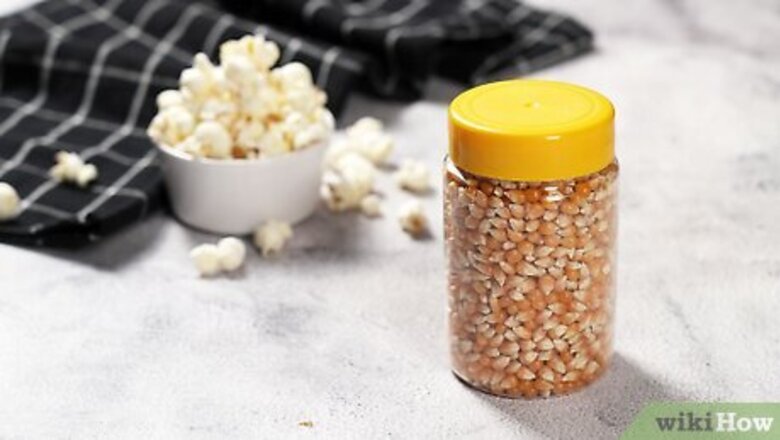
views
Can popcorn expire?
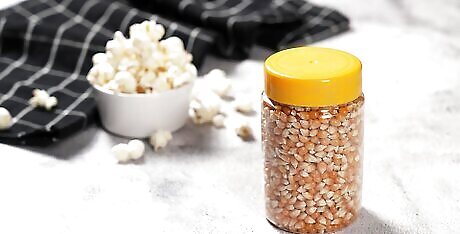
Yes, unpopped popcorn kernels can expire after 1-2 years. Unpopped kernels that come in large jars or tins for stovetop popping have the longest shelf life out of any popcorn variety, typically lasting 1-2 years as long as it’s well stored in an airtight container. Storing them in a dry, cool place is key, as moisture is truly what shortens the shelf life of popcorn. Unpopped kernels don’t exactly spoil, but they can dry out over time, leading fewer of them to pop when placed over heat or in the microwave. Unpopped microwave popcorn can last up to 8 months, as long as it’s kept sealed in a cool, dark place. Once popped, however, it lasts 1-2 weeks, so it’s recommended that you only pop the amount you want to eat. Although the popcorn may still be edible after this period of time, the quality and flavor probably won’t be up to par.
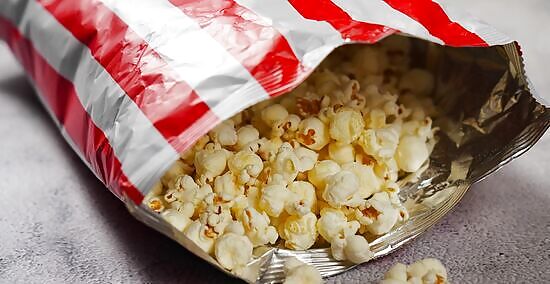
Opened bags of popped popcorn can go bad after 1-2 weeks. Popcorn that has already been popped and sold in bags has a much shorter shelf life than an unpopped bag of popcorn. Typically, opened bags of popcorn last from 1-2 weeks, depending on the kind of popcorn. Seasoning can negatively affect the shelf life of popcorn, since spices usually require butler or oil to stick to the popcorn, adding extra moisture that can cause it to become stale more quickly.
Signs Unpopped Kernels are Expired

They’re dry. Popcorn kernels typically maintain their moisture for about a year. Soon after though, they tend to become really dry and can even develop mold. Super old and dry kernels will fail to pop, but even if they do, the popcorn will likely be stale, dry, burnt, or otherwise unpleasant to eat.
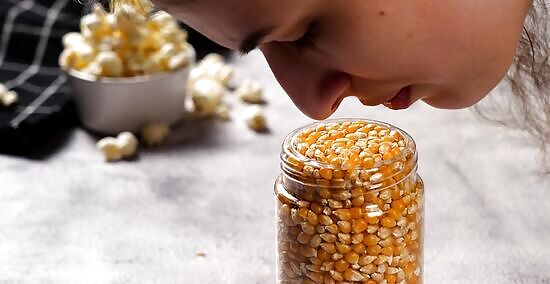
They have an off-putting smell. A musty or rancid smell is a clear indicator that the kernels have gone bad and maybe even that bacteria or mold has set in. It’s best to abstain from trying to turn the kernels into popcorn if the smell is off in any way.
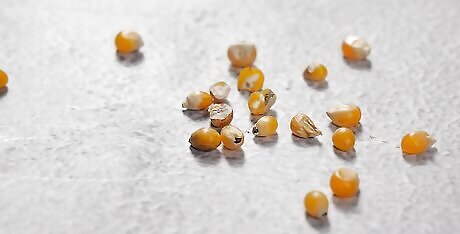
They’re discolored or moldy. If your unpopped kernels have white spots, have turned dark or black, or have a strange texture, they’re probably no good to eat. Signs of discoloration often point to mold growth, and consuming mold in any amount is inadvisable.
Signs Popped Popcorn is Expired

It's chewy. Chewiness is one of the first tell-tale signs that your popcorn has gone stale. Although this won’t affect your health in any way, it will affect the pleasure of your eating experience. One of the main reasons people love popcorn is its crunchy, crispy texture, so eating stale popcorn might not sufficiently scratch your popcorn itch.

It has a bad odor. If your popcorn has an off or rancid smell, you should steer clear. This may not just mean that the popcorn is past its prime, but it could point to mold or bacteria growth, which you should never consume. Eating moldy popcorn or popcorn with signs of bacteria could lead to real health concerns, like discomfort, diarrhea, and food poisoning in extreme cases. Studies show that popcorn can carry salmonella, the same bacteria in uncooked chicken. Popcorn with added flavors, such as caramel corn, are more likely to be hotbeds for mold, bacteria, and insects.
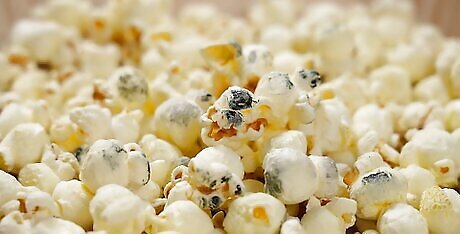
It has an off-color. Discoloration is a giveaway that the popcorn has spoiled. Dark brown or green spots are often due to mold or mildew, and other changes in color may reflect the popcorn’s decay in quality. Don’t store popcorn in moist environments, as those circumstances are perfect for mold growth. Mold releases harmful chemicals called mycotoxins, which could require a trip to the emergency room.

It tastes rancid. A foul appearance is typically coupled with a foul taste, although tasting should be the last method you use to detect whether popcorn is still good to eat. Rancid, stale, or overwhelmingly earthy flavors usually signals expired popcorn. While this may not lead to gastrointestinal distress, it could be unpleasant to eat.
Can you eat expired popcorn?

It’s not advisable to eat expired popcorn. Although there may not be any health-related side effects to eating expired popcorn, the flavor and quality of the popcorn degrades over time, leading to a less than ideal eating experience. The popcorn may lose its original crunch, becoming chewy and stale. Moreover, be sure to watch for signs of discoloration or mold, as consuming moldy popcorn could have adverse health effects, like respiratory issues, allergies, and digestive problems.
How to Maximize Popcorn Freshness
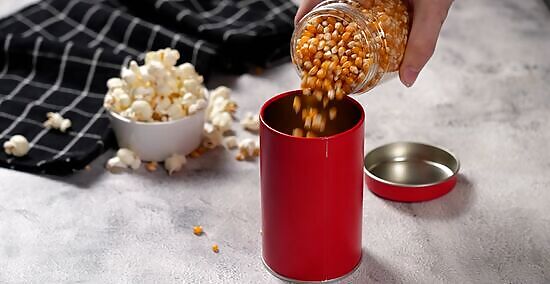
Store kernels in an airtight container. Keeping the kernels sealed in the right container will maintain freshness longer. Try to use metal tins instead of glass jars as these are better designed to lock out moisture. Metal gives your popcorn and your kernels the right balance of light and controlled temperature for optimal storage conditions.

Keep the container in a cool, dry place. Your pantry or cupboard are both good options to maintain the crispy integrity of your kernels. Do not place your kernel containers in direct sunlight or anywhere damp because this can cause mold to grow. Even if there is no mold, warming up the kernels too much may result in fewer of them popping into popcorn. Expired popcorn can keep its crunchy quality about a month after the date on the package.
How to Restore Popcorn Freshness

Restore freshness in the oven, air fryer, or on the stove. If popped popcorn has sat in your pantry a bit past its expiration date and you fear it may not be as crunchy as it was meant to be, you can try reheating it in an oven, air fryer, or on the stove to restore its freshness. The same goes for unpopped kernels, which may not pop at all if they’re expired. If you microwave your popcorn and find a ton of unpopped kernels, try dropping those leftover kernels into a pot on the stove with 3 tablespoons (14 grams) of coconut or extra virgin olive oil per every 1/3 cup (42 grams) of kernels. The added heat and pressure will help them to pop. If your popcorn is popped and you want to help maintain freshness, lay them onto a tray and place them into the oven for five minutes at around 250 degrees Fahrenheit (121 degrees Celsius). You can apply this same technique in your air fryer basket. They should regain their crispy, delightful texture.













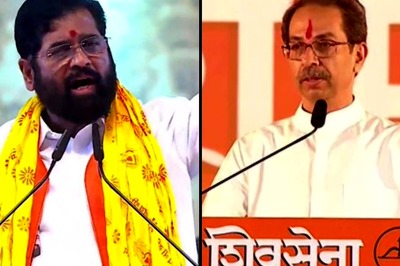


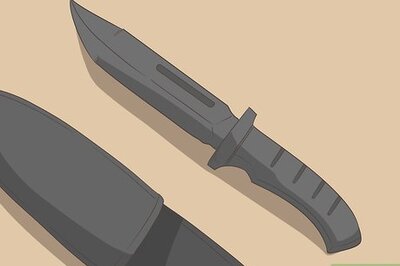


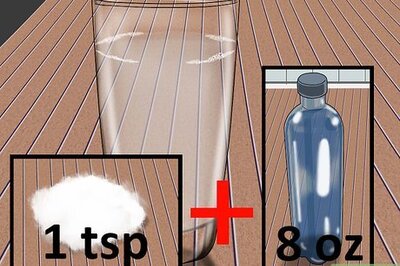
Comments
0 comment